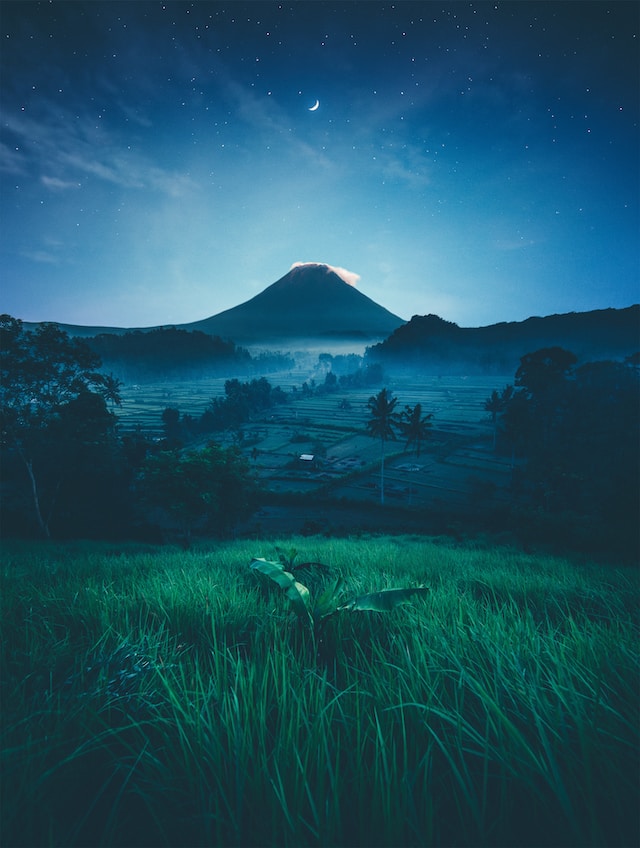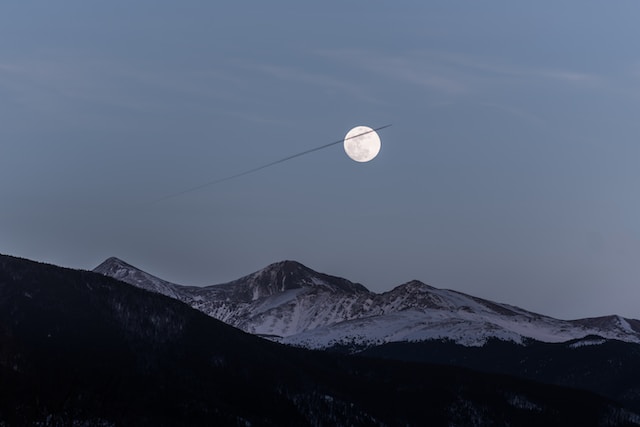The Moon Princess

Today I decided to write a fairytale that’s been on my mind for a while.
Fragments of this tale are from a story I heard as a child, and have stayed with me for many years. However, as much as I tried I could not find the original story, nor could I remember how the bulk of it went. All that remained in my memory was the impression the moon princess made on me, more a fleeting feeling than anything else.
So I decided to try and re-tell it with a new story.
The Moon Princess
Once upon a time, when the mountains were still black and when all sorts of folk was wandering the earth, there was a king. He ruled over the Hitachi mountains, just across from the Beremond Pass that leads into the Salty Plains below.
His kingdom was one of high, bare, black mountains, deep crags, dark valleys and rocky passes. It was a wild and dangerous land, full of trolls and dwarves and all kinds of eldritch beings. At night wolves roamed the forests, and witches went about the peaks with their claws out, ready to strike an unwary wanderer.
The king ruled his kingdom year in, year out, but he was never happy. What he lacked was a queen who would live with him in the castle high above the black peaks. Hardly any noble ladies ever made the journey into the Hitachi mountains, and those who did were soon glad to leave the region behind again.
One night the king was woken in the night by a shaft of light shining through his window. It tickled his face and when he opened his eyes, the moon was standing above the black mountains. It was large and white and shone so bright that you could see every rock, every stone, every crag on the mountains.
“If only I could harness this wonderful light,” the king thought, “I would surely be happy.”
The next night he bade his soldiers to shave slivers of moonlight with their swords. But try as they might, they could not cut the light. The king consulted his most skilled general.
“The light is thinner than air,” the general said, “and no blade can cut air. You must consult someone else.”
The following night the king bade his fishermen to catch the moonlight in their nets. But try as they might, they could not net the light. The king asked them what the problem was.
“The light is thinner than water,” the fishermen said, “and no net can catch water. You must consult someone else.”
The king sent messengers to all corners of his kingdom, to search for someone who could catch the moonlight for him. One by one they came back, and none had found anyone skilled enough. At long last, the last of the messengers returned.
“I went up into the mountains,” he said, “beyond the Eiris Pass. One night I came upon a witch who went about her business on the dark paths. ‘Don’t you know how to catch moonlight?’ I asked her. ‘Nay,’ she said, ‘But you might want to speak to the dwarves.’ So I continued, high into the Altan mountains, where the cliffs are even balcker, and the crags even deeper. There I found a gate leading into the mountain. It was closed, but I came upon a lonely dwarf with a hammer and chisel. ‘Don’t you know how to catch moonlight?’ I asked him. ‘Nay,’ he said, ‘but the king under the mountains might.’ I wandered the Altans for many nights and days, but I have not found a path to this king.”
The news delighted the king. He sent out his most skilled trappers and rangers, to find a way to the king under the mountains. They were gone for many days, but at long last they found the stone gates the messenger had spoken of.
The king and his court travelled through the Hitachis, through the Eiris Pass and high into Altan. At the gates they were met by a procession of dwarves who led them deep under the earth, to meet the dwarven king under the mountains.
The dwarven lands were vast, and dark, and seemed endless with their silent halls and winding tunnels. When they at last arrived in the throne room, it was lit with a thousand candles and the dwarf king was seated on a throne carved from pure quartz.
The king explained his wish to trap the moonlight. The dwarven king thought about it for a while, and then said: “What you need is pure moonlight, that is thicker than air, and thicker than water. You must travel to the moon itself and catch it at its source.”
“But how can I travel to the moon?” cried the king.
“I will build you a carriage that will carry you,” said the dwarven king, “but it is expensive. It will cost you a ton of gold and a half ton of gemstones.”
“Anything,” said the king, “if only I can have the moonlight.”
And so it came that the king returned to his black castle in the black mountains, and waited while the dwarves built a carriage. It took them many, many days to forge it, for it was made of gold that was spun so finely and wrought so delicately that it could travel on a beam of moonlight.
At last the dwarves delivered the carriage and demanded their payment. The king gave them a ton of gold, and half a ton of gemstones, just as he’d promised.
“But who will draw the carriage?” he asked the dwarves, “surely my horses are too heavy?”
“Alas, you must find the mist people, who travel the forests between night and day,” said the dwarves, “They can fashion wings out of dew that are lighter than air.”
The king once again sent out his trappers and rangers, to find the mist people. They climbed into the deep valleys and ravines, and followed the streams to their hidden springs, but as the mist people can only be seen when it is neither day nor night, one by one they returned without success. After many days the last ranger returned.
“I came upon a strange place,” he said, “it was in a ravine so deep that no sunlight ever touches the ground. There was a lake surrounded by a forest so black that only twilight reigned beneath it. There I saw the mist people dancing over the waters of the lake, for it is neigher night nor day down there.”
The king was delighted by the news, and he and his courts set out to travel to the black lake. When they arrived a thick fog hung in the ravine, and wisps of mist wallowed over the water, where the transparent mist people waited upon a lady swathed in robes of spidersilk and dew.
“Why have you come to my domain?” the lady asked the king.
He explained that he wished to trap the moonlight, but needed wings for his golden carriage. The Grey Lady thought about it for a while, and then said: “I think we can help you, but it will cost you. We want the freedom to dance in the forests at dusk and at dawn.”
The king thought that was a fair deal and agreed. He returned to his black castle in the black mountains and waited. It took the mist people many, many days, but at long last they arrived at the castle carrying large wings made from spidersilk, adorned with thousands of tiny dew drops. The king granted them the freedom to dance in his forests at dusk and at dawn, and they returned to their lake.
Finally, the king was ready to travel. When the next full moon stood above the castle, he had his golden carriage brought to the ramparts, and had the misty wings attached to it. Then he climbed inside and commanded: “Carry me to the moon, for I wish to find the source of the moonlight.”
At once the carriage started to move. It rode on the thin beams of moonlight, high into the sky. Higher and higher it rose, until the castle was barely a dot in the mountains beneath. Still it rose, until the mountains were just a sea of blackness below. And the carriage flew through the night, steadily towards the moon.
Many hours later, the king awoke to find the carriage standing still. He looked out the window and saw a strange landscape around him. The carriage stood on a rolling plain so vast that he could not make out its boundaries, and everything was white. The grass was white, the flowers were white, the trees were white, and the stream flowing past his carriage was also white.
The king thought it was the most beautiful landscape he had ever seen. He left the carriage where it stood, and started to wander about on the plains. In the distance he could see white hills and a white forest. He set out to explore this strange land.
He wandered through the white forest and over the white hills for many hours, until he came upon a whitle castle with white towers and ramparts and a white drawbridge over a moat with white water. Within resided the moon king, who welcomed him warmly and bade him stay in the castle for a while, as they had never received such a colourful visitor before.
He king liked to stay in the moon castle very much, and in the evening he regaled the white court with tales from his kingdom in the Hitachi mountains. The moon king and his daughters especially liked the stories about colours. The dark green forests in the valleys, the black mountains, the blue sky, and the yellow sun.
After the king had stayed in the castle for some time, he thought he had found the source of the moonlight: it seemed to enamate from the moon people themselves. They glowed from within, and everywhere they went, they shone a white light upon the ground and the area around them.
He decided to ask the moon king for his youngest daughter’s hand. The moon king said: “If my daughter is willing to marry you, I shall not forbid it.”
So the king asked the moon princess to become his wife and return with him to his kingdom.
“Oh, I would love to see the blue sky and the green forests,” exclaimed the princess, and because she had grown very fond of the colourful king, she agreed.
And so it came that not long after the king and the moon princess climbed into the winged golden carriage and the king commanded: “Carry me home, for I wish to return with my bride!”
The carriage rose, and on a beam of moonlight they rode many hours all the way back to the king’s castle in the mountains.
Soon after they arrived, a big wedding was held. The entire court donned colourful clothes to honour the princess, and the dwarves and the mist people were invited and paid their respects. For some time the king was very happy. His new wife was very lovely indeed – her skin glowed white, and wherever she went she left a faint delicate trail of light behind, like moonlight.
The moon princess delighted in the colours that she had never seen before: the blue sky, the yellow sun, and the green forests. But as the full moon waned at night, so did the trail of light she left behind when she walked. When the moon waxed again, it grew stronger again.
But the summer was short, and soon autumn was coming over the mountains. The sky was no longer blue, but often hung with heavy dark storm clouds. The forests appeard darker and darker, and the mountains were as black as ever.
The shorter the days grew, and the longer the nights, the more the princess stood on the ramparts at night, looking at the white moon. As winter fell, the princess fell ill. “This land is so dark and so black,” she said, “the mountains are suppressing me. I cannot breathe.”
Her husband the king bade doctors and healers and wise men come to the castle to cure her, but with each waning moon the princess grew weaker and weaker.
One day the king of the dwarves heard about the princesses plight. He sent an envoy to the king who said: “I can help you cure the princess, but it will cost you dearly. I will require all the silver from all the mines in your kingdom.”
All the king cared about was his lovely wife, so he agreed to let the dwarves take all the silver they needed from all the mines in his whole mountain kingdom. It took many, many days, and the moon princess grew weaker and weaker.
But at long last the dwarves had mined all the silver, and there was none left. The princess was now so weak that she could no longer stand on the ramparts to watch the moon. The king had his masons open up a large window in the princesses’ bedroom, so she could still watch the moon at night.
But then something strange happened. As the princess watched the waning moon disappear over the black mountains one night, she thought she saw a glimmer of silver on a mountain top. The next night she saw another glimmer on another mountain.
And she was not mistaken. The dwarves had hammered the silver into sheets as thin as light, and forged it into threads as thin as moonlight. Night after night they spun the silver threads over the black mountains, from peak to peak, from crag to crag.
Each night the princess looked out her window, and slowly, peak by peak, the black mountains began to glow. It took many, many nights, but at long last the black mountains of Hitachi glowed as white in the moonlight as the grassy plains and wooded hills of her homeland.
Each night, the moon and the stars shone down on the silver mountain peaks, and during the day the sun shone on slopes and hillsides as white as snow. The princess soon regained her health and her skin glowed white once more, and she emitted a faint delicate light wherever she went.
To thank the dwarves for their help, the king granted them sovereignity over the whole of the Altan mountains for as long as there was a king under the mountains.
More From This Blog

What do people read on their commute?
I spy with my little eye...My recent obsession is to spy on other people’s reading habits on the commuter train. On my way to work I first take a bus, then a tram, and then another bus. My way home is timed so that I can catch an express train, ond only have to take...

Do I have writer’s block?
So, I wrote myself into a corner and can't get out.The story is stuck. My little band of adventurers has once again failed to locate Agrimon, who is never where he's supposed to be. But I feel that they've been chasing after him for far too long now. Something else...
Project Bible
Recently I came across a discussion about writer's tools and tricks that they use for writing. Among the slew of dictionaries and grammarly links, one author said that she has a "book bible" - a notebook or folder where all her notes about her current project are...
